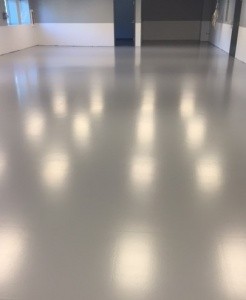Just like any home or workplace improvement project, time is one of the most important factors, and in some cases, time is money. For a successful polymer flooring installation, everything and everybody must stay off the floor until the coating has cured. This can certainly slow production and cost companies money. The good news is there are many types of fast-cure polymer coatings and additives that can help speed up the process.
When it comes to polymer flooring projects, time is money
 Your flooring needs are the first thing to consider when estimating how long a floor will take to install. If your concrete substrate requires a lot of patching, heavy prepping, joints to be filled, or build thickness to hide imperfections, the installation process will take much longer. Typically, some of the lengthiest-to-install systems require diamond grind preparation, a primer, epoxy mortar coat, epoxy grout coat, an epoxy build coat, and a urethane topcoat. Something like this, depending on the crew, could take as many as five or six days. However, if you are just looking for a thin mil system to help protect your floor and add some aesthetics, this can be done fairly quickly. A thin mil system might only require prep, an epoxy primer, and a urethane topcoat, and could take as little as two days.
Your flooring needs are the first thing to consider when estimating how long a floor will take to install. If your concrete substrate requires a lot of patching, heavy prepping, joints to be filled, or build thickness to hide imperfections, the installation process will take much longer. Typically, some of the lengthiest-to-install systems require diamond grind preparation, a primer, epoxy mortar coat, epoxy grout coat, an epoxy build coat, and a urethane topcoat. Something like this, depending on the crew, could take as many as five or six days. However, if you are just looking for a thin mil system to help protect your floor and add some aesthetics, this can be done fairly quickly. A thin mil system might only require prep, an epoxy primer, and a urethane topcoat, and could take as little as two days.
Of course, there are always options and products that can help speed up the process. Polyaspartics can be applied as a build coat or a protective topcoat, and sometimes take as little as two hours to cure. Polyaspartics are also popular when doing decorative floors because they do not amber over time like some epoxies. There are also fast curing epoxy hardeners that can be used in epoxy grout coats, high build coats, and primers that allow them to cure or be recoated in as little as 4 or 5 hours. Even urethane concrete, used because of its great thermal shock resistance and high moisture tolerance, can be accelerated to cure within 6 to 8 hours. Sometimes there are disadvantages to these accelerated products, the most common being working time and pot life, so make sure to consult the manufacturer for some advice before installing.
Don’t know whether to re-coat, repair or replace your industrial floor? Our Industrial Flooring Self-Assessment Tool can help you determine the ideal solution for your unique application.

- A Faster Cure for Flooring Needs: Polyaspartics in Action - April 8, 2025
- The Case for Epoxy Mortar in Manufacturing - April 8, 2025
- Epoxy Mortar Flooring: Built for Heavy-Duty Performance - March 29, 2025


